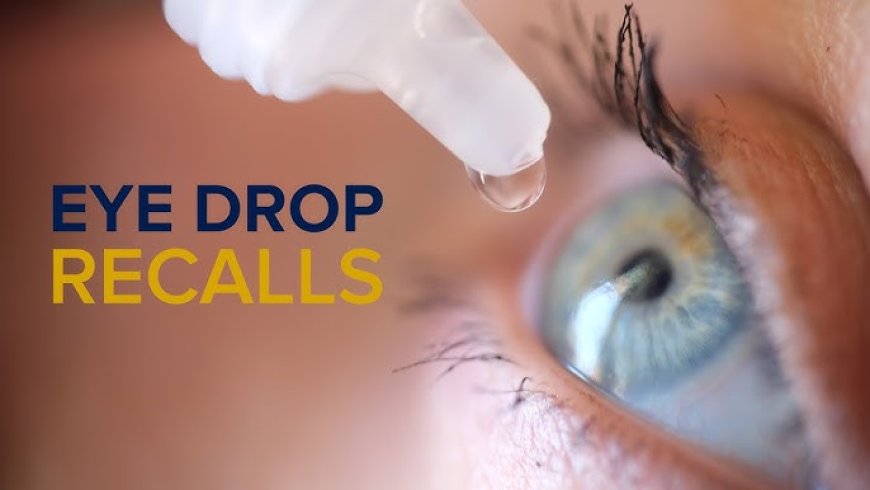Eye Drops Recalled: What You Need to Know About Recent FDA Warnings

Introduction
In recent months, the U.S. Food and Drug Administration (FDA) has issued multiple recalls and safety alerts concerning various eye drop products. These actions stem from concerns over sterility, contamination, and manufacturing violations, posing potential risks to consumers' eye health. This article provides a comprehensive overview of the affected products, reasons behind the recalls, and guidance for consumers to ensure their safety.
Understanding the Recalls
Reasons for the Recalls
The primary reasons for the recent eye drop recalls include:
-
Sterility Concerns: Products were found to be non-sterile, increasing the risk of eye infections.
-
Contamination: Some products were contaminated with bacteria or fungi, posing serious health risks.
-
Manufacturing Violations: Deviations from Current Good Manufacturing Practices (cGMP) were identified during FDA inspections.
Notable Recalls
BRS Analytical Services & AvKARE
In April 2025, over 75,000 cases of eye care products, including eye drops and artificial tears, were recalled due to sterility concerns. The products, distributed nationwide between May 2023 and April 2025, were found to have cGMP violations during an FDA audit. This recall was classified as Class II, indicating that the use of these products could cause temporary or medically reversible adverse health consequences.
Alcon Laboratories – Systane Lubricant Eye Drops Ultra PF
In December 2024, Alcon Laboratories voluntarily recalled one lot (Lot 10101) of its Systane Lubricant Eye Drops Ultra PF due to fungal contamination. The contamination was discovered after a consumer reported foreign material in a sealed vial, which was identified as fungal upon investigation. Although no adverse events were reported, the recall was initiated as a precautionary measure.
Kilitch Healthcare India Limited
The FDA warned consumers in late 2023 not to purchase or use certain eye drops from Kilitch Healthcare India Limited due to the risk of eye infections. The products were found to be contaminated and posed significant health risks, leading to a voluntary recall by the manufacturer.
Table: Summary of Recent Eye Drop Recalls
| Manufacturer | Product Name | Reason for Recall | Recall Date | FDA Classification |
|---|---|---|---|---|
| BRS Analytical Services/AvKARE | Multiple Eye Care Products | Sterility Concerns, cGMP Violations | April 2025 | Class II |
| Alcon Laboratories | Systane Lubricant Eye Drops Ultra PF | Fungal Contamination | December 2024 | Class II |
| Kilitch Healthcare India Ltd. | Various Eye Drops | Bacterial Contamination | November 2023 | Class I |
List: Brands and Retailers Involved in Recalls
Several brands and retailers have been affected by these recalls. Consumers should check their products and discontinue use if they belong to the following:
-
Brands:
-
Systane
-
Leader
-
Rugby
-
CVS Health
-
Equate
-
Rite Aid
-
Target Up&Up
-
-
Retailers:
-
Walmart
-
CVS
-
Rite Aid
-
Target
-
Publix
-
Kroger
-
Fred Meyer
-
Ralphs
-
QFC
-
Consumer Guidance
Identifying Recalled Products
Consumers should:
-
Check Lot Numbers: Verify the lot number and expiration date on the packaging against the FDA's recall list.
-
Inspect Packaging: Look for signs of tampering or contamination.
-
Consult Healthcare Providers: If experiencing any adverse symptoms after using eye drops, seek medical attention promptly.
Reporting Adverse Events
Adverse reactions or quality problems can be reported to the FDA's MedWatch Adverse Event Reporting program:
-
Online: FDA MedWatch Online Reporting
-
Phone: 1-800-332-1088
-
Mail: Download the form and send it to the address provided on the FDA website.
Conclusion
The recent recalls of eye drop products underscore the importance of stringent manufacturing practices and regulatory oversight to ensure consumer safety. While no widespread adverse events have been reported, the potential risks associated with contaminated or non-sterile eye drops can be severe. Consumers are advised to remain vigilant, check their eye care products against the FDA's recall lists, and consult healthcare professionals if they experience any issues. Staying informed and proactive is key to safeguarding one's eye health.





























